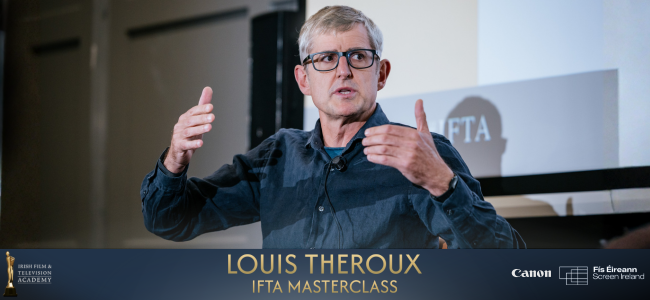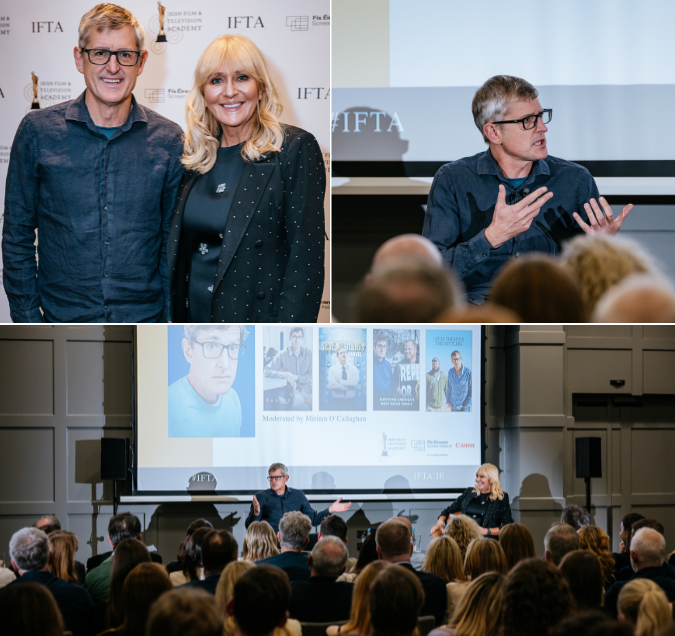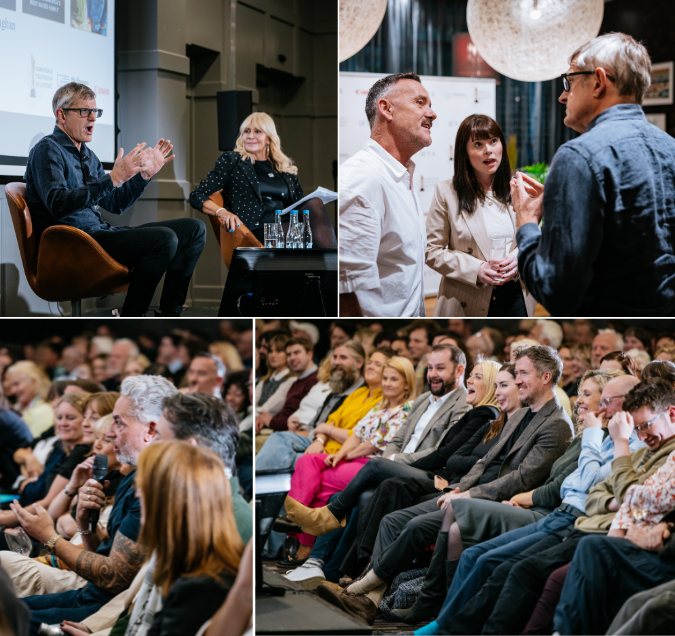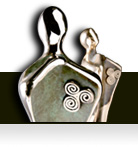
IFTA MASTERCLASS WITH LOUIS THEROUX
Hosted by Miriam O Callaghan
World renowned filmmaker and journalist, Louis Theroux, delivered a powerful and entertaining IFTA Masterclass sharing fascinating stories from his work and his
career The event was moderated by Miriam O’Callaghan and supported by Fís Éireann/Screen Ireland and Canon. The audience was made up of key names in the Irish Documentary and filmmaking community, who hailed the event as ‘an unforgettable evening’.
Louis spoke about his approach to tackling complex subjects, covering everything from the
Church of Scientology and Jimmy Savile, to the Westboro Baptist Church and Israeli settlers.
Miriam spoke with Louis about how he has become one of documentary film’s most distinctive
voices, and he described his own work as “an empathetic appreciation of our differences, but
also our similarities”. Louis’ work is known for shining a light on intriguing beliefs, behaviours and institutions, and
uses a gentle questioning and informal approach that ultimately offer rounded portraits of the
people involved in complex social issues and human dilemmas. Known for films such as My
Scientology Movie and this year’s acclaimed The Settlers, he is a three-time BAFTA winner and
Emmy nominee. He is also the host of Spotify’s The Louis Theroux Podcast.
“It’s been such a pleasure
spending a couple of nights in Dublin... I’m a student of strange cultures, weird people, toxic
people — and I’ve never felt more at home for the last couple of days.”
Louis Theroux

Louis’ big break in TV happened under the mentorship of the iconic Michael Moore, previous
subject of an IFTA Masterclass in Dublin, who hired him for his series TV Nation (1994-95).
“What he saw in me, it's kind of a mystery, he gave me - with no experience - a job as a
correspondent on a network TV show.”
Working with Michael inspired his approach to interviewing: “He’s got this all-American persona, but he's also highly intelligent, and wily. He appears guileless, but actually there's this machinating intelligence that I think, without realising it, I wouldn't say I emulated it, but... people sometimes call me faux-naive. And I think Michael always had a quality of being faux-naive.”
He pivoted to making documentaries for the BBC with Weird Weekends:: “Truthfully, I didn't
particularly want a documentary series on the BBC. I wanted to write on sitcoms in Hollywood. And I tried very hard to do that, and Hollywood said ‘No, we don't want you. We don't want Louis Theroux making any kind of sitcoms or writing on one”.
Louis also gave insights into his feature docs such as My Scientology Movie and The Settlers and
his interviews with celebrities on his podcast. The enduring message from the discussion was “Always think of your audience, always think about what's going to connect with people.”
Louis took questions from the audience, including presenter Baz Ashmawy who asked about the
work it takes off-camera to achieve a great rapport with his interviewees on-screen. Louis
replied: “It’s hard to know how much of it is deliberate and how much is organic. Michael Moore
saw in me a kind of vulnerability and insecurity, eagerness to please, it’s not a quality I'm particularly proud of or whether I’ve got it. I find it odd when people say ‘I like your programmes, they’re so awkward’ when we work so hard to make them not awkward.”
“To be here in Dublin, meeting young filmmakers and connecting with the incredible talent emerging from this generation—it’s a real thrill. I know it might sound cheesy, but I’m genuinely a fan of Irish culture. I grew up in a literary family, my dad was a writer, so being in a place with such a rich artistic heritage means a lot to me.”
Louis Theroux

The event concluded with IFTA CEO Aine Moriarty presenting Louis with a special framed
Recognition Award from the Academy in honour of his contributions to the industry. His final words were about the inspiration he gets from his children.
“I know the world's scary, dangerous, dark... but on the plus side, I feel like there's so much in culture that's fascinating. I learn so much, both from [my children’s] musical taste, their taste in media, the way in which they engage with what's going on. Curiosity is not really something you can learn, but I think it's something that you can be, you can encourage and cultivate. By being curious, you connect with the part of you that perhaps at times can feel lonely, the part of you that feels like you are maybe different, or an outsider.”
